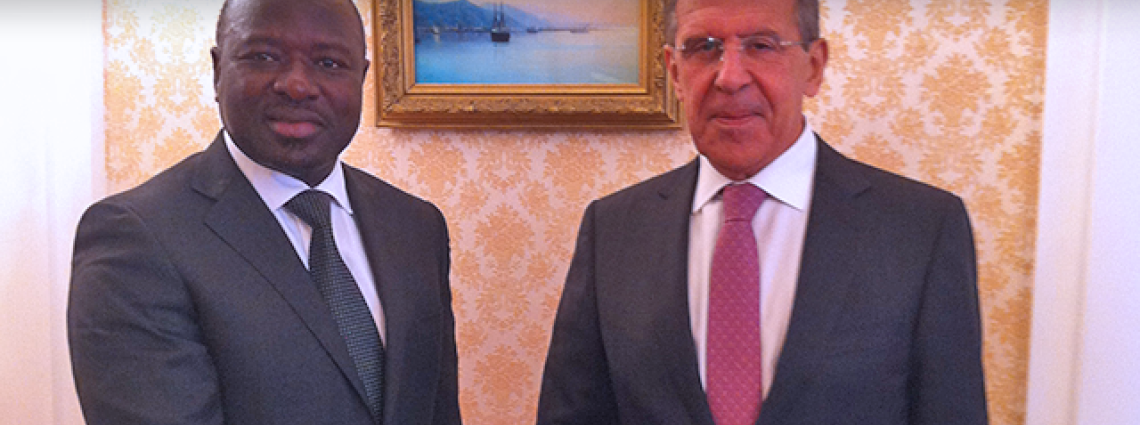CTBTO head visits Moscow, signs tsunami warning agreement
Foreign Minister Lavrov expressed Russia’s ongoing commitment to support the entry into force of the Comprehensive Nuclear-Test-Ban Treaty (CTBT). Zerbo thanked Lavrov for “Russia's political commitment to the Treaty at the highest level and promoting its entry into force."
Zerbo also expressed his hope that Russia could help encourage the CTBT’s signature by Syria, saying: "If Syria showed its will and readiness to join the CTBT, this could send a positive message to the region. It would be very important for our work and for the functioning of the Treaty and would bring us closer to the creation of a zone free of weapons of mass destruction in the Middle East."

Russian Foreign Minister Lavrov (right) and CTBTO Executive Secretary Lassina Zerbo

Former Russian Foreign Minister Igor Ivanov is a member of the Group of Eminent Persons (GEM).
The Comprehensive Nuclear-Test-Ban Treaty Organization is a key element to nuclear non-proliferation…The entry into force of the CTBT will strenghen the global security architecture.
Zerbo emphasized that "no country should feel isolated from the point of view of the Treaty" and called upon Russia’s support to help convince those eight remaining countries of the CTBT’s security benefits and in particular in findings ways to engage with the DPRK.
Zerbo also met with Deputy Head of the Russian State Nuclear Energy Corporation ROSATOM, Vitaly Kamenskih, to discuss certification of the Russian radionuclide stations and Russia’s contribution to the development of the on-site inspection regime, in particular preparations for the next full-scale inspection exercise, the Integrated Field Exercise 2014 in Jordan.

Harsh climatic conditions render operation & maintenance of primary seismic station PS36 at Petropavlovsk-Kamchatski challenging.
Radionuclide station RN60 at Petropavlovsk-Kamchatski is one of two stations that detected traces of radioactive noble gases consistent with the 13 February 2013 announced DPRK nuclear test.
In addition to reliably detecting nuclear explosions, CTBTO data can be used for civil and scientific uses such as tsunami early warning or scientific research. During his visit, Zerbo signed a tsunami warning agreement with Alexei Malovichko, Director of the Geophysical Survey of the Russian Academy of Sciences, Russia. This agreement enables Russia to receive data from certain IMS stations in near-real time to issue more timely and precise tsunami warnings. Russia is the 11th country to have signed such an agreement with the CTBTO.
• Top CTBTO official visits Moscow for talks (Press TV)
• Dr Zerbo counts on Russia (Vestnik Kavaza)
• Lavrov calls for CTBT to come into force as soon as possible (ITAR-TASS)
• Russia to be able verify compliance with CTBT in 2014 (ITAR-TASS)
• Russian military official meets with CTBTO Preparatory Commission executive secretary (Interfax)
• CTBTO Hopeful Syria Will Sign Test Ban Pact (National Journal)
• ?? ????????? ?? ?????????? ? ???? ???????? ? ??????? ??????? ????????? (Ria Novosti)
• ?????? ????????? ?? ????????? ??????????? ???????? ? ?????????????• ?????????? ??????? ????????? - ??????????? ??????? ?? (ITAR-TASS)
• ????? ????? ?? ??????? ????????? ??????? ??????? ?? ??????? ??????? ????, ????????? ?? ?????? ????????? ??????????? – ??????? (ITAR –TASS)
• ?????? ???????? ???????? ???? ??????? ???????? ?? ??????????? ??????? ??????? ????????? ? 2014 ???? (ITAR-TASS)
• ????? ?.????? ? ????? (UNIVETSITY)
4 Oct 2013
